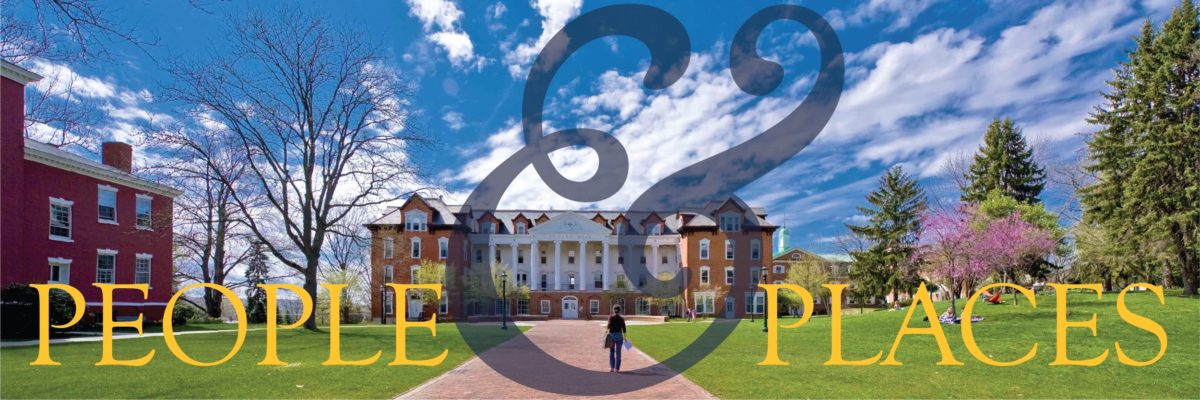
People & Places: February 2020
Michael Michaelides, assistant professor in economics, recently had published an article in the scholarly journal Economic Modelling, Vol. 85. Titled “On Modeling Heterogeneity in Linear Models Using Trend Polynomials,” the article explores different possible modeling techniques and forms a recommendation for how to model data exhibiting time heterogeneity in the context of linear models.
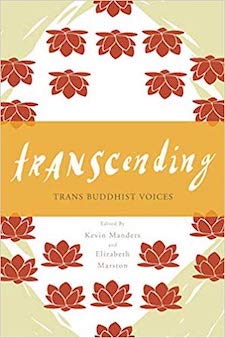 Associate Dean of Students for Community & Belonging justin adkins published a piece in the edited volume Transcending: Trans Buddhist Voices by North Atlantic Books. Transcending is the first anthology of its kind to give voice to the experiences of transgender, genderqueer, and non-binary Buddhists. Over 30 contributors from both the Mahayana and Theravada traditions are gathered together in this book to present a vision for a trans Buddhist sangha in the 21st century. justin’s piece, “Right now… it’s like this,” tracks his physical as well as spiritual journey. He explores how transition and Buddhist practice are similar, stating that both require that you live in the present moment.
Associate Dean of Students for Community & Belonging justin adkins published a piece in the edited volume Transcending: Trans Buddhist Voices by North Atlantic Books. Transcending is the first anthology of its kind to give voice to the experiences of transgender, genderqueer, and non-binary Buddhists. Over 30 contributors from both the Mahayana and Theravada traditions are gathered together in this book to present a vision for a trans Buddhist sangha in the 21st century. justin’s piece, “Right now… it’s like this,” tracks his physical as well as spiritual journey. He explores how transition and Buddhist practice are similar, stating that both require that you live in the present moment.
Co-authors from Penn State University, along with Assistant Professor of Environmental Science & Sustainability Casey Bradshaw-Wilson, recently published a paper titled “Dietary Variability of the Rainbow Darter (Etheostoma caeruleum) in Northwestern Pennsylvania.” This peer-reviewed manuscript will appear in an upcoming issue of Northeastern Naturalist.
Assistant Professor of Economics Kathryn Bender had findings from her research on wild horse internet adoptions published in the peer-reviewed journal Sustainability. “Home Off the Range: The Role of Wild Horse Internet Adoptions in Informing Sustainable Western United States Rangeland Management” uses data from the Bureau of Land Management to estimate the effect of training and physical characteristics on both the likelihood of a wild horse being adopted and its adoption price. The paper discusses how the research findings can inform future policy decisions regarding fertility programs, gathers, and adoption incentives to address the $15 billion wild horse and burro management issue.
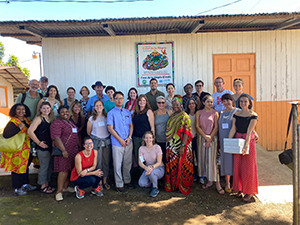 Caryl Waggett, associate professor of global health studies, facilitated a professional development workshop for 24 educators from around the globe in Brunca, Costa Rica, in January: Integrating Experiential Learning into Global Health Education. Educators came from medical schools, schools of public health, and undergraduate-serving institutions. The workshop was co-hosted by Allegheny College, American Association of Colleges and Universities (AAC&U), Association of Schools and Programs of Public Health (ASPPH), Child Family Health International, Centro Interamericano para Salud Global, Consortium of Universities for Global Health (CUGH), and the Working Group on Global Activities by Students at PreHealth Levels (GASP). Field site visits included complementary health clinics at the indigenous territory Ngabe-Bugle de la Casona, health clinics at the Panama-Costa Rican border, and (shown above) a daycare center, Casa de la Alegria, funded by local coffee fincas to support the indigenous families that migrate for the coffee harvest and recognized by UNICEF, and were structured to model and help faculty design activities, assignments, and approaches for engaging students in appropriate global health experiences.
Caryl Waggett, associate professor of global health studies, facilitated a professional development workshop for 24 educators from around the globe in Brunca, Costa Rica, in January: Integrating Experiential Learning into Global Health Education. Educators came from medical schools, schools of public health, and undergraduate-serving institutions. The workshop was co-hosted by Allegheny College, American Association of Colleges and Universities (AAC&U), Association of Schools and Programs of Public Health (ASPPH), Child Family Health International, Centro Interamericano para Salud Global, Consortium of Universities for Global Health (CUGH), and the Working Group on Global Activities by Students at PreHealth Levels (GASP). Field site visits included complementary health clinics at the indigenous territory Ngabe-Bugle de la Casona, health clinics at the Panama-Costa Rican border, and (shown above) a daycare center, Casa de la Alegria, funded by local coffee fincas to support the indigenous families that migrate for the coffee harvest and recognized by UNICEF, and were structured to model and help faculty design activities, assignments, and approaches for engaging students in appropriate global health experiences.
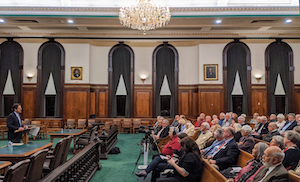 Brian Harward, professor and Robert G. Seddig Chair in Political Science, gave the annual Robert H. Jackson Day address on Wednesday, February 12, at the Warren County Courthouse in Warren, Pa. His talk, “Presidential Power in the Modern Era,” was based on his recent book on the presidency and explored both recent events and historical patterns of presidential power.
Brian Harward, professor and Robert G. Seddig Chair in Political Science, gave the annual Robert H. Jackson Day address on Wednesday, February 12, at the Warren County Courthouse in Warren, Pa. His talk, “Presidential Power in the Modern Era,” was based on his recent book on the presidency and explored both recent events and historical patterns of presidential power.
 The Catholic University of America Press has just published the book “Origins of Catholic Words” (ISBN 978-0-8132-3230-0, 576 pages) by Professor of Mathematics Anthony Lo Bello. It is an etymological dictionary of the vocabulary of Christianity in general and of the Catholic Church in particular. The book addresses the thesis of Sir Kenneth Clark, proposed in the second program of his television series “Civilization,” that “It could be convincingly argued that Western civilization was basically the creation of the church.” The book will be the subject of Lo Bello’s Faculty Lecture Series address on March 4.
The Catholic University of America Press has just published the book “Origins of Catholic Words” (ISBN 978-0-8132-3230-0, 576 pages) by Professor of Mathematics Anthony Lo Bello. It is an etymological dictionary of the vocabulary of Christianity in general and of the Catholic Church in particular. The book addresses the thesis of Sir Kenneth Clark, proposed in the second program of his television series “Civilization,” that “It could be convincingly argued that Western civilization was basically the creation of the church.” The book will be the subject of Lo Bello’s Faculty Lecture Series address on March 4.
Frederick F. Seely Professor of English Christopher Bakken has recently published poetry or has poetry forthcoming in Orion, The Southern Review, The Hopkins Review, Blackbird, and The Gettysburg Review. His work also appears in two new anthologies, Plume Poetry 8 and The Eloquent Poem (Persea Books, 2019). He served as judge on the poetry committee for the GLCA New Writers Award for 2019.
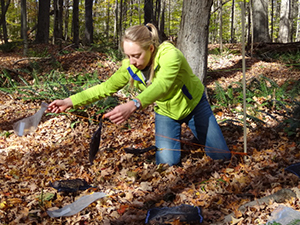 Richard Bowden, professor of environmental science and sustainability, along with Sarah Wurzbacher ’11, Susan Washko ’16, Lauren Wind ’15, Alexandria Rice ’17, Adrienne Coble ’04, Nick Baldauf ’04, Brittany Johnson ’03, and colleagues from Oregon State University and the University of Toronto, coauthored the paper “Long-term Nitrogen Addition Decreases Organic Matter Decomposition and Increases Forest Soil Carbon” at the annual meeting of the American Geophysical Union. The paper, based on a 25-year study at the Bousson Experimental Forest, found that long-term atmospheric pollution reduces rates at which soil organic matter is processed by the soil microbial community, thus lowering the availability of nutrients that contribute to forest productivity. Bowden also coauthored an invited presentation, “Soil Carbon, Where Does It Come From? Where Does It Go? Insights from the Long-Term DIRT Network.” The presentation described how results across network sites in the U.S., Europe and China reveal means by which climate, soils, microbial communities and vegetation govern soil carbon dynamics in diverse forested systems.
Richard Bowden, professor of environmental science and sustainability, along with Sarah Wurzbacher ’11, Susan Washko ’16, Lauren Wind ’15, Alexandria Rice ’17, Adrienne Coble ’04, Nick Baldauf ’04, Brittany Johnson ’03, and colleagues from Oregon State University and the University of Toronto, coauthored the paper “Long-term Nitrogen Addition Decreases Organic Matter Decomposition and Increases Forest Soil Carbon” at the annual meeting of the American Geophysical Union. The paper, based on a 25-year study at the Bousson Experimental Forest, found that long-term atmospheric pollution reduces rates at which soil organic matter is processed by the soil microbial community, thus lowering the availability of nutrients that contribute to forest productivity. Bowden also coauthored an invited presentation, “Soil Carbon, Where Does It Come From? Where Does It Go? Insights from the Long-Term DIRT Network.” The presentation described how results across network sites in the U.S., Europe and China reveal means by which climate, soils, microbial communities and vegetation govern soil carbon dynamics in diverse forested systems.
Bowden, along with Sydney Winter ’22, Isabela Petronka ’22, Rebecca Montgomery ’20, Margo Beck ’22, Sebastian McRae ’22, Katherine Brozell ’23, Megan Kresse ’22, Oscar Spiker ’22, and Danielle Studer ’22, judged middle and high school science projects at the PA Jr. Academy of Sciences Region 10 Competition at Penn State-Behrend. PJAS is a statewide organization designed to stimulate and promote interest in science middle and high school students.
Pictured above: Susan Washko ’16 placing leaf samples at the Bousson Experimental Forest. Photo Credit: Richard Bowden